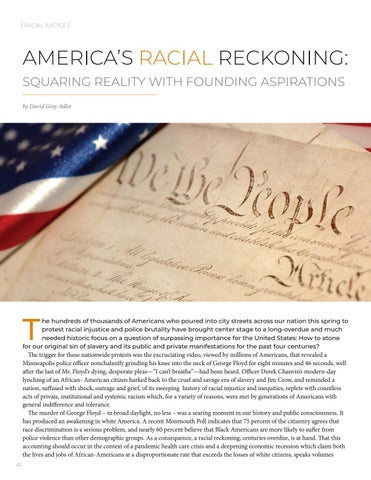| RACIAL JUSTICE |
AMERICA’S RACIAL RECKONING: SQUARING REALITY WITH FOUNDING ASPIRATIONS by David Gray Adler
T
he hundreds of thousands of Americans who poured into city streets across our nation this spring to protest racial injustice and police brutality have brought center stage to a long-overdue and much needed historic focus on a question of surpassing importance for the United States: How to atone for our original sin of slavery and its public and private manifestations for the past four centuries?
The trigger for these nationwide protests was the excruciating video, viewed by millions of Americans, that revealed a Minneapolis police officer nonchalantly grinding his knee into the neck of George Floyd for eight minutes and 46 seconds, well after the last of Mr. Floyd’s dying, desperate pleas—“I can’t breathe”—had been heard. Officer Derek Chauvin’s modern-day lynching of an African- American citizen harked back to the cruel and savage era of slavery and Jim Crow, and reminded a nation, suffused with shock, outrage and grief, of its sweeping history of racial injustice and inequities, replete with countless acts of private, institutional and systemic racism which, for a variety of reasons, were met by generations of Americans with general indifference and tolerance. The murder of George Floyd – in broad daylight, no less – was a searing moment in our history and public consciousness. It has produced an awakening in white America. A recent Monmouth Poll indicates that 75 percent of the citizenry agrees that race discrimination is a serious problem, and nearly 60 percent believe that Black Americans are more likely to suffer from police violence than other demographic groups. As a consequence, a racial reckoning, centuries overdue, is at hand. That this accounting should occur in the context of a pandemic health care crisis and a deepening economic recession which claim both the lives and jobs of African-Americans at a disproportionate rate that exceeds the losses of white citizens, speaks volumes 42









